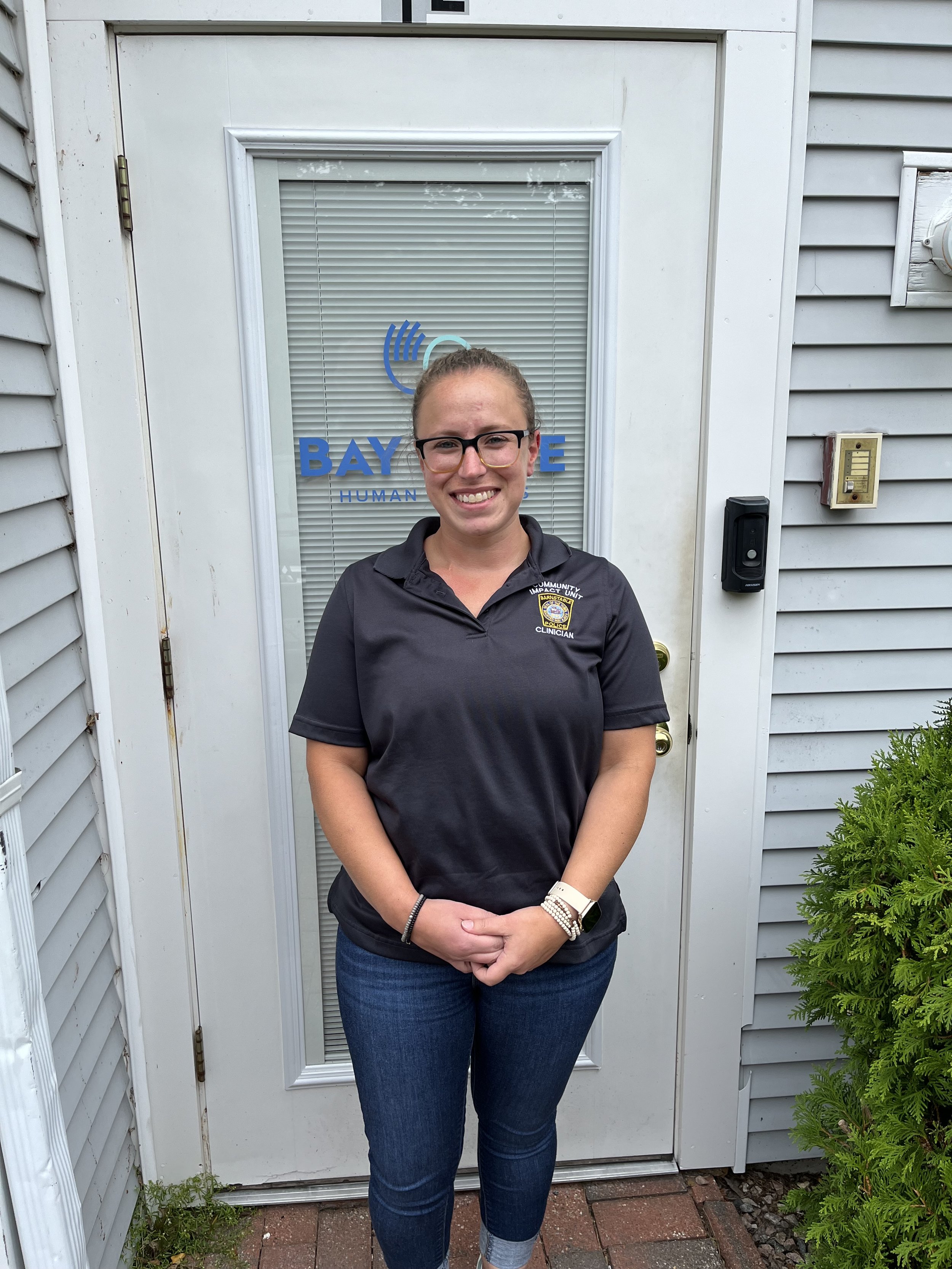Partnering to Improve Outcomes
Clinician Stephanie Rubel at Bay Cove’s Behavioral Health Urgent Care program on Cape Cod.
When an individual in the community experiences a mental health crisis event, police response is frequently the result—in order to assess the situation, and to protect the person themselves and/or others who may be around them. Unfortunately, the outcome of these encounters can often be incarceration or hospitalization for the individual in distress, when, in many cases, the person in question would be better served by community-based treatment options.
This summer, Stephanie Rubel—a clinician with Bay Cove’s Behavioral Health Urgent Care program on Cape Cod—began performing ride-alongs with Barnstable Police Department personnel, accompanying them on calls dealing with people experiencing mental health-related issues. Stephanie has been able to partner with the Barnstable PD through a special Co-response Jail Diversion Grant, funded by the Massachusetts Department of Mental Health.
“If a call for a mental health emergency comes over the dispatch, I ride with the patrol car assigned to respond,” says Stephanie, who holds a Master’s degree in Forensic Psychology, and is also a Certified Nursing Assistant. “On scene, I perform an evaluation of the person’s status. Sometimes we encounter people who are suicidal, or have impaired judgement to the point where they can’t take care of themselves, and they require Section 12 hospitalization. But, on other occasions, we’re talking about someone who’s confused, or upset, and just really needs someone to talk to.”
Having someone with Stephanie’s specialized training as part of police response has helped more individuals receive the appropriate level of care, while reducing the pressure on overworked emergency rooms “One important outcome [of this initiative] is that we’re keeping people from having to go to the hospital,” she says. “You could have somebody with suicidal ideations, for example, that we’re able to bring to Bay Cove’s Community Crisis Stabilization program, or to another outpatient program, without requiring a trip to the ER or a long wait for a psych bed. We tend to find that if you can get people into a less regimented and more comfortable setting than a hospital, the results are often much better.”
For their part, the Barnstable Police are pleased with the early results of the grant program. “The ride-along program has been successful,” says Lieutenant Jennifer Ellis of the Barnstable Police Department. “One thing we’ve seen is that there is a lot of overlap between Bay Cove clients and individuals encountered by BPD, and Stephanie’s knowledge of these individuals has proven invaluable to providing improved outcomes. Additionally, [Stephanie’s presence] has relieved officers of the burden of sometimes making a difficult determination on whether a Section 12 [designation] should be issued. There are always clear situations, but we are often faced with ‘gray areas,’ and it is particularly helpful to have Stephanie available for those calls.”
With Cape Cod being a small and insular community, Stephanie agrees that her familiarity with the area and some of its residents with ongoing mental health challenges can be a major advantage. “Sometimes we do respond to calls involving people I’ve personally worked with, or who Bay Cove has patient records on. If it’s someone that I’m familiar with, I may be able to see that an individual is ‘bordering’ on a problematic behavior—but also can identify that it’s something they can come back from. That’s something, of course, that the police wouldn’t know.”
Stephanie also sees the benefit of her presence as an intermediary between the police and the public—two groups that have seen increasing wariness of each other develop in recent years. “Obviously, I defer to the police when it comes to the threat assessment of any given situation we go into,” she says. “But, once safety is established, there have been plenty of instances where we encounter someone in a state of anxiety, and I can step into the mix and say, ‘I’m a clinician, not a cop,’ and I’ll see people visibly start to let their barriers down and talk about what’s causing the situation.”
And as Stephanie has spent more time working with members of the BPD, she’s done her best to help officers become more familiar with what to look for in their dealings with people experiencing a psychiatric crisis, along with questions and behaviors that can help to de-escalate conflicts and make better outcomes possible. “There are certain assessments that I make when I’m talking to someone that really help determine their state of mind—things like, are they sleeping, are they eating, are they isolating themselves, do they feel hopeless, do they feel impulsive?—and the police aren’t trained to ask these kind of questions. I’ve shared those insights with officers as a way of helping increase their knowledge base, and they’ve been receptive to that.”
Lt. Ellis agrees, adding “Stephanie’s presence has positively impacted officers’ interactions with individuals requiring intervention. We know that many individuals would rather speak with a civilian than a police officer, but she has also guided and taught officers about different options and resources available for assisting persons in mental health crises.”
Stephanie is encouraged by the direction she sees policing heading in, and is pleased to be part of a growing commitment to treating people with behavioral challenges with more understanding, and to using all the possible resources available to help them. “You know… people are allowed to have mental illness and live in the community—as long as they’re not hurting anybody,” she says. “It’s just that police historically haven’t always been well equipped to deal with those situations. I’m excited to have the opportunity to be involved with helping both sides—the community and the police—interact in a way that benefits everyone.”
Return to Annual Report

